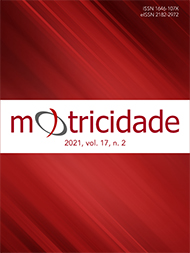Determinantes da satisfação e comportamento positivo de clientes em academias fitness
DOI:
https://doi.org/10.6063/motricidade.20570Palabras clave:
marketing, comportamento do consumidor, gestão da qualidade, economiaResumen
O objetivo da presente investigação foi analisar a relação preditiva da qualidade dos serviços e percepção do preço sobre a satisfação e o comportamento positivo de clientes de academia de fitness na cidade do Recife, Pernambuco, Brasil. A amostra foi constituída por 385 indivíduos que se identificaram como clientes de Academias. O instrumento utilizado foi um questionário adaptado, multidimensional, composto por um total de trinta e seis itens, aplicado presencialmente dentro das academias. Os dados foram analisados a partir de uma análise de equações estruturais em duas etapas (two-step), no software estatístico AMOS 24.0. A análise do modelo de medida, após um processo de refinamento, indicou um bom ajustamento aos dados. No modelo estrutural, os serviços impactaram positivamente tanto na satisfação quanto no comportamento positivo, enquanto a percepção do preço impactou negativamente no comportamento. Portanto, conclui-se que prestar um serviço de qualidade é um aspecto essencial na aquisição de clientes satisfeitos, que consequentemente irão se comportar de maneira positiva, ao recomendar, renovar a matrícula e comprar novos produtos da academia.
PALAVRAS-CHAVE: marketing; comportamento do consumidor; gestão da qualidade; economia.
Descargas
Publicado
Número
Sección
Licencia
The authors of submitted manuscripts must transfer the full copyright to Journal Motricidade / Sílabas Didáticas Editions. Granting copyright permission allows the publication and dissemination of the article in printed or electronic formats, and copyrights start at the moment the manuscript is accepted for publication. It also allows Journal Motricidade to use and commercialise the article in terms of licensing, lending or selling its content to indexation/abstracts databases and other entities.
According to the terms of the Creative Commons licence, authors may reproduce a reasonable number of copies for personal or professional purposes, but without any economic gain. SHERPA/RoMEO allows authors to post a final digital copy (post-printing version) of the article on their websites or on their institutions' scientific repository.


